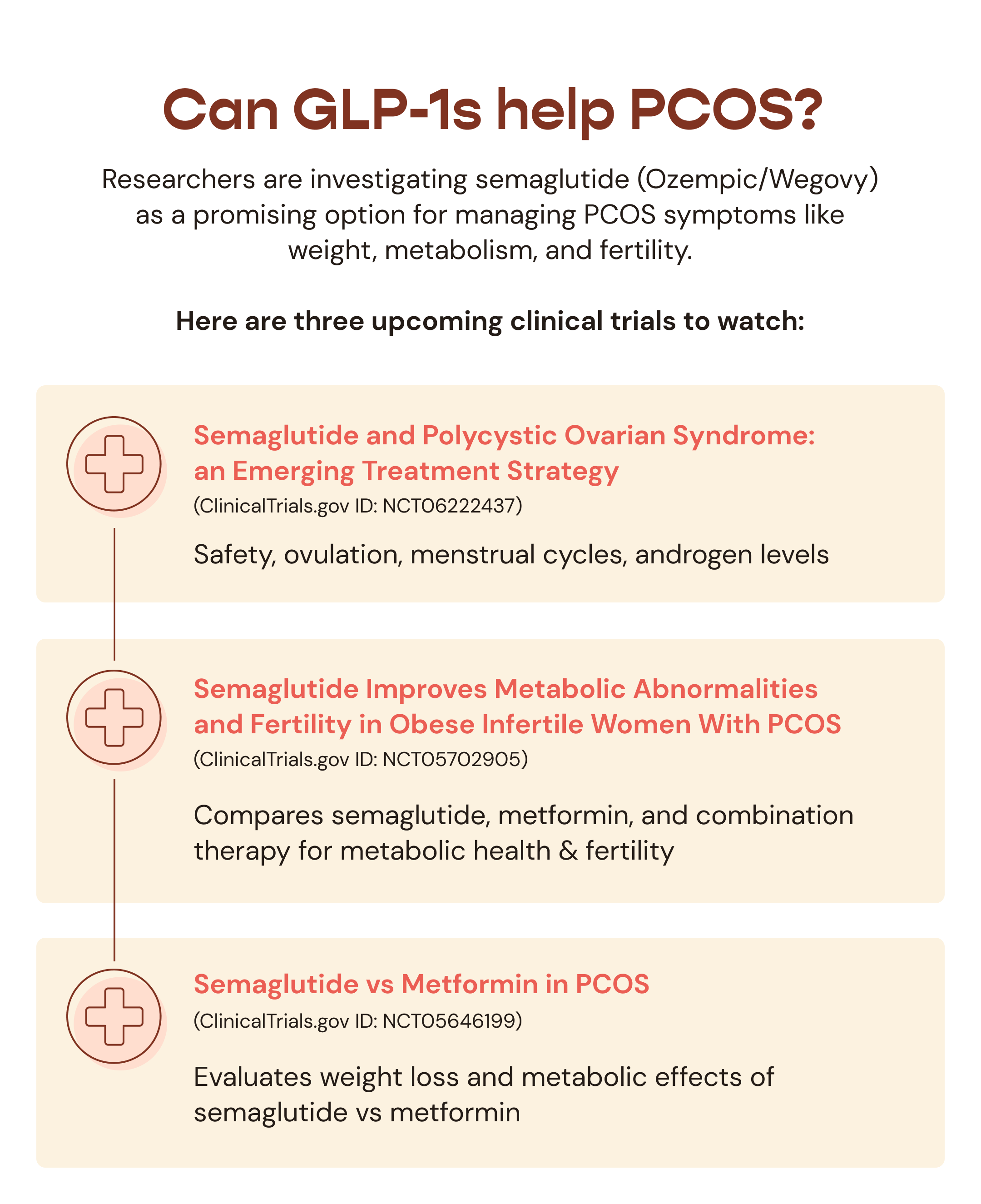
GLP-1s (Ozempic/Semaglutide) for PCOS: A Pelvic PT Guide
Polycystic Ovary Syndrome (PCOS) doesn’t just affect your hormones and metabolism. It can also change how your pelvic floor feels and functions. Symptoms like irregular periods, weight changes, pelvic or sexual pain, or bladder and bowel issues can make everyday life a whole lot more challenging. Pelvic health physical therapy can help you stay active, reduce pain, and feel more comfortable while managing this complex condition.
While pelvic floor therapy addresses the musculoskeletal and pelvic pain side of PCOS, there’s growing interest in new medications that may support your hormonal and metabolic health at the same time.
PCOS affects an estimated 6 million women in the U.S., yet it’s often underdiagnosed and misunderstood. Many people spend years searching for answers and struggling to find effective, evidence-based treatments. That’s why researchers are exploring new approaches to fill these gaps. GLP-1 receptor agonists like Ozempic and Wegovy are being studied not just for diabetes and weight management, but also for their potential to improve some of the most challenging PCOS symptoms.
Research is still in the early stages, but GLP-1 medications could one day become an important part of PCOS care. Here’s what you need to know.
What is Ozempic (semaglutide)?
Ozempic is a prescription medication approved by the FDA to help manage blood sugar and lower the risk of kidney and cardiovascular problems in people with Type 2 diabetes. Its active ingredient, semaglutide, is part of a drug class called GLP-1 receptor agonists.
How does Ozempic work in the body?
Ozempic (semaglutide) lowers blood sugar in people with Type 2 diabetes by encouraging the pancreas to make more insulin, slowing digestion, and keeping the liver from releasing more sugar.
It also works in the brain to help reduce appetite, calm food cravings, and help you feel full, which can lead to weight loss.
In a higher-dose form (as Wegovy), semaglutide is FDA-approved for weight management in those who are considered obese, or overweight with certain health risks.
Why semaglutide is getting attention?
These GLP-1 agonists have skyrocketed in popularity. Because it influences metabolism, inflammation, and brain signaling, semaglutide has been called the “everything drug” in the media. And research is exploring its potential benefits beyond diabetes and weight loss.
Clinical trials are underway to study GLP-1 medications for things like heart failure, smoking cessation, alcohol use disorder, nonalcoholic fatty liver disease, and even neurodegenerative conditions like Alzheimer’s.

While not all of these uses are proven (and some may never be), the fact that semaglutide is being investigated for so many different conditions is very exciting, especially for those with PCOS.
How can GLP-1 medications help PCOS symptoms?
GLP-1 medications like semaglutide may help several common challenges of PCOS:
- Weight management: Even a 5% weight loss can help balance hormones and regulate menstrual cycles. But weight loss can be especially challenging if you have PCOS. Semaglutide may make it easier, which can also improve pelvic pressure, mobility, and even exercise tolerance.
- Blood sugar control: Up to 80% of people with PCOS have insulin resistance, which can affect both diabetes risk and pelvic floor function. Lifestyle changes and metformin are standard treatments if you have PCOS, but early research suggests semaglutide may also help improve insulin sensitivity in people with Type 2 diabetes.
- Inflammation reduction: Lowering inflammation can help ease pain sensitivity, including in your pelvic floor. Semaglutide has been shown in animal studies to reduce ovarian inflammation in mice with PCOS, and early human research hints at similar anti-inflammatory effects.
- Fertility considerations and menstrual regularity: PCOS is one of the most common causes of infertility in those capable of pregnancy. Semaglutide may be able to help indirectly by supporting weight loss, improving menstrual cycle regularity, and possibly improving the uterine lining. However, it should be stopped at least 2 months before trying to conceive since semaglutide’s safety in pregnancy is unknown.
Can semaglutide help PCOS?
It’s not clear yet if Ozempic can treat PCOS. Ozempic isn’t FDA-approved for PCOS, but some providers prescribe it off-label for potential benefits. Early studies suggest semaglutide may help with PCOS-related symptoms like insulin resistance and body size, as well as BMI and waist circumference. However, much more research is needed to fully answer this question.
Is Ozempic for PCOS safe?
Your provider will review your health history before prescribing. General conditions or circumstances that would make this medication unsafe for you (contraindications) include:
- Personal or family history of medullary thyroid carcinoma
- Multiple Endocrine Neoplasia syndrome type 2
- Allergies to semaglutide or other ingredients in Ozempic
Will insurance cover semaglutide for PCOS?
It’s not likely that insurance will cover semaglutide for PCOS alone, but your prescriber can help you explore options that are best for you.
Most insurance will only cover semaglutide if it’s prescribed for an FDA-approved use. Currently, semaglutide is only FDA-approved for:
- Type 2 diabetes (as Ozempic or Rybelsus)
- Weight management in those who are considered obese, or overweight with certain health risk factors (as Wegovy)
Why pelvic health PT still matters?
Medications like Ozempic may be able to help with the metabolic and hormonal side of PCOS, but pelvic PT supports the musculoskeletal and functional side. This is important so you can move better, feel better, and make the most of your PCOS care plan. The best results happen when your PCOS care team works together.
Pelvic PT can help with:
- Pain relief: Reducing tension and coordinating pelvic floor muscles to help ease pain with sex, pelvic pressure, or bladder and bowel issues.
- Movement and exercise guidance: Safe, sustainable activity to help manage weight, improve insulin sensitivity, and reduce inflammation.
- Education and empowerment: Helping patients understand their diagnosis, symptoms, and treatment options so they can better navigate their care.
- Managing side effects: Helping with constipation, bloating, or diarrhea that sometimes occur with GLP-1 medications.
- Whole-person care: Collaborating with other providers (gynecologists, endocrinologists, dietitians, mental health professionals) to address PCOS from every angle.
Managing Ozempic side effects
Ozempic can slow digestion and lead to constipation, bloating, and diarrhea, all of which can affect your pelvic floor.
- Teaching techniques to make bowel movements easier
- Recommending gentle stretches or abdominal massage
- Guiding you ON hydration and fiber strategies that work with (not against) how semaglutide affects your gut
Combining Ozempic and pelvic PT for better PCOS care
While Ozempic isn’t FDA-approved specifically for PCOS, early research shows it may help improve insulin resistance, support weight loss, and regulate cycles for some people.
But medications alone can’t address every challenge PCOS brings. Pelvic health physical therapy helps you protect your core and pelvic floor, manage Ozempic side effects, and keep you active so you can make the most of your treatment plan.
If you have PCOS and are curious about whether Ozempic (semaglutide) could be right for you, or if you’re already taking it and want to protect your pelvic health,our team at Origin Physical Therapy is here to help. Book your visit today and get expert, whole-person care that supports every part of your PCOS journey.
Sources Cited
- "Highlights of Prescribing Information: Ozempic (semaglutide)." U.S. Food and Drug Administration, 2022, https://www.accessdata.fda.gov/drugsatfda_docs/label/2022/209637s012lbl.pdf.
- Amisi, C. A. "Markers of Insulin Resistance in Polycystic Ovary Syndrome Women: An Update." World Journal of Diabetes, vol. 13, no. 3, 15 Mar. 2022, pp. 129–149. PubMed Central, doi:10.4239/wjd.v13.i3.129.
- Barber, T. M., et al. "Obesity and Polycystic Ovary Syndrome: Implications for Pathogenesis and Novel Management Strategies." Clinical Medicine Insights: Reproductive Health, vol. 13, 9 Sept. 2019, doi:10.1177/1179558119874042.
- Carmina, E., and R. A. Longo. "Semaglutide Treatment of Excessive Body Weight in Obese PCOS Patients Unresponsive to Lifestyle Programs." Journal of Clinical Medicine, vol. 12, no. 18, 12 Sept. 2023, p. 5921. doi:10.3390/jcm12185921.
- "ClinicalTrials.gov Search Results for Semaglutide." U.S. National Library of Medicine, https://www.clinicaltrials.gov/search?term=SEMAGLUTIDE&viewType=Table&page=1&rank=44.
- "FDA Approves Ozempic (Semaglutide) as the Only GLP-1 RA to Reduce the Risk of Worsening Kidney Disease and Cardiovascular Death in Adults with Type 2 Diabetes and Chronic Kidney Disease." PR Newswire, https://www.prnewswire.com/news-releases/fda-approves-ozempic-semaglutide-as-the-only-glp-1-ra-to-reduce-the-risk-of-worsening-kidney-disease-and-cardiovascular-death-in-adults-with-type-2-diabetes-and-chronic-kidney-disease-302362466.html.
- "FDA Approves Wegovy (Semaglutide) for Adults with Obesity." Drugs.com, 2021, https://www.drugs.com/newdrugs/fda-approves-wegovy-semaglutide-adults-obesity-5551.html.
- Fonseca, Vivian A., et al. "Reductions in Insulin Resistance Are Mediated Primarily via Weight Loss in Subjects with Type 2 Diabetes on Semaglutide." The Journal of Clinical Endocrinology & Metabolism, vol. 104, no. 9, Sept. 2019, pp. 4078–4086. doi:10.1210/jc.2018-02685.
- Jensterle, Mojca, et al. "Semaglutide Reduces Fat Accumulation in the Tongue: A Randomized Single-Blind, Pilot Study." Diabetes Research and Clinical Practice, vol. 178, 2021, 108935. doi:10.1016/j.diabres.2021.108935.
- Jensterle, M., et al. "The Role of Glucagon-like Peptide-1 in Reproduction: From Physiology to Therapeutic Perspective." Human Reproduction Update, vol. 25, no. 4, 1 July 2019, pp. 504–517. doi:10.1093/humupd/dmz019.
- Kommu, S., and P. Whitfield. "Semaglutide." StatPearls, updated 11 Feb. 2024, StatPearls Publishing, 2025 Jan–. https://www.ncbi.nlm.nih.gov/books/NBK603723.
- Liu, M., et al. "Semaglutide Alleviates Ovary Inflammation via the AMPK/SIRT1/NF-κB Signaling Pathway in Polycystic Ovary Syndrome Mice." Drug Design, Development and Therapy, vol. 18, 4 Sept. 2024, pp. 3925–3938. doi:10.2147/DDDT.S484531.
- Loh, H. H., et al. "Sexual Dysfunction in Polycystic Ovary Syndrome: A Systematic Review and Meta-Analysis." Hormones (Athens), vol. 19, no. 3, Sept. 2020, pp. 413–423. doi:10.1007/s42000-020-00210-0.
- Melo, A. S., et al. "Treatment of Infertility in Women with Polycystic Ovary Syndrome: Approach to Clinical Practice." Clinics (São Paulo), vol. 70, no. 11, Nov. 2015, pp. 765–769. doi:10.6061/clinics/2015(11)09.
- "Ozempic Side Effects." Ozempic.com, https://www.ozempic.com/how-to-take/side-effects.html.
- "Polycystic Ovary Syndrome: What You Need to Know." Endocrine Society, https://www.endocrine.org/-/media/endocrine/files/patient-engagement/hormones-and-series/hormones_and_polycystic_ovary_syndrome_what_you_need_to_know.pdf.
- “Semaglutide and Polycystic Ovarian Syndrome: an Emerging Treatment Strategy.” ClinicalTrials.gov, identifier NCT06222437. U.S. National Library of Medicine, https://www.clinicaltrials.gov/study/NCT06222437. Accessed 20 Aug. 2025.
- “Semaglutide Improves Metabolic Abnormalities and Fertility in Obese Infertile Women with Polycystic Ovary Syndrome.” ClinicalTrials.gov, identifier NCT05702905. U.S. National Library of Medicine, https://www.clinicaltrials.gov/study/NCT05702905. Accessed 20 Aug. 2025.
- “Semaglutide vs Metformin in Polycystic Ovary Syndrome (PCOS).” ClinicalTrials.gov, identifier NCT05646199. U.S. National Library of Medicine, https://www.clinicaltrials.gov/study/NCT05646199. Accessed 20 Aug. 2025.
- Shukla, A., L. I. Rasquin, and C. Anastasopoulou. "Polycystic Ovarian Syndrome." StatPearls, updated 7 July 2025, StatPearls Publishing, 2025 Jan–. https://www.ncbi.nlm.nih.gov/books/NBK459251.
- "Wegovy’s New Uses, Cost, and Safety." Axios, 28 July 2025, https://www.axios.com/2025/07/28/wegovy-new-uses-cost-safety.
- Wang, L., et al. "Relationship between Pelvic Floor Muscle Function and Insulin Resistance among Non-Diabetic Females: A 3D Ultrasound Evaluation." Journal of Obstetrics and Gynaecology, vol. 44, no. 1, Dec. 2024, p. 2381569. doi:10.1080/01443615.2024.2381569.
- Yaribeygi, H., et al. "Anti-Inflammatory Benefits of Semaglutide: State of the Art." Journal of Clinical & Translational Endocrinology, vol. 36, 28 Mar. 2024, 100340. doi:10.1016/j.jcte.2024.100340.
- "Recommendations from the 2023 International Evidence-Based Guideline for the Assessment and Management of Polycystic Ovary Syndrome." American Society for Reproductive Medicine, https://www.asrm.org/practice-guidance/practice-committee-documents/recommendations-from-the-2023-international-evidence-based-guideline-for-the-assessment-and-management-of-polycystic-ovary-syndrome.




